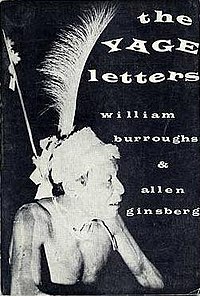The Yage Letters: Difference between revisions
No edit summary |
reverting information on the band (doesn't seem notable after googling for the album title / band members) |
||
| Line 39: | Line 39: | ||
[[Category:Ayahuasca]] |
[[Category:Ayahuasca]] |
||
[[Category:Works by Allen Ginsberg]] |
[[Category:Works by Allen Ginsberg]] |
||
== '''The Yage Letters''' == |
|||
Band from Barrow-In-Furness / Cumbria. 1991 - 1997. |
|||
Chris Burke - Guitars & Vocals. Steve Crabtree - Guitars & Vocals. |
|||
The Yage Letters released just one album - Northern Melodica Mews - notable for the fact it took over five years to record. The group reputedly never played live but both Burke and Crabtree were well known musicians on the Furness musical circuit (Crabtree played with indi-rockers 'The City of Thieves' and 'The Behans') Burkes early career before co-founding 'The Yage Letters' is unknown.<br /> |
|||
Northern Melodica Mews was recorded in A/O Studios, Millom of which Burke and Crabtree were co-owners. |
|||
'''Northern Melodica Mews<br />''' |
|||
''Track Listing;'' |
|||
Lullaby<br /> |
|||
Just Good Friends<br /> |
|||
Consequences for the Clockcard King<br /> |
|||
Domestic Mantra<br /> |
|||
From Blue to Blue<br /> |
|||
Monkey Island (She's Looking Down)<br /> |
|||
Lush Life<br /> |
|||
Spiders & Flowers<br /> |
|||
Revision as of 13:44, 8 January 2008
 1990s City Lights Books paperback edition. | |
| Author | William S. Burroughs and Allen Ginsberg |
|---|---|
| Language | English |
| Genre | Correspondence, autobiography, drug culture |
| Publisher | City Lights Books |
Publication date | 1963 |
| Publication place | United States |
| Media type | Print (Hardcover and Paperback) |
| Pages | 68 pp |
| ISBN | NA Parameter error in {{ISBNT}}: invalid character |
The Yage Letters, first published in 1963, is a collection of correspondence and other writings by Beat Generation authors William S. Burroughs and Allen Ginsberg. It was issued by City Lights Books.
Most of the letters date back to 1953 and chronicles Burroughs' visit to the Amazon rainforest in search of yagé (ayahuasca), a plant with near-mythical hallucinogenic and some say telepathic qualities. Along the way, Burroughs and Ginsberg share other stories and anecdotes, including some concepts Burroughs would later use in novels such as Naked Lunch. The book ends with further correspondence written in 1960 detailing Ginsberg's experiments with the yagé drug.
Beyond the letters themselves, the book is noteworthy for two short pieces by Burroughs. The anarchic "Roosevelt After Inauguration", a savage parody of American politics in which "a purple-assed baboon" is appointed to the United States Supreme Court, was omitted from the original edition of the book on the grounds it might be considered obscene; it was subsequently issued as a chapbook later in the 1960s and was later published in the small volume Roosevelt After Inauguration and Other Atrocities with two political essays. The story was restored to The Yage Letters in a later reprinting by City Lights.
The second notable piece serves as the epilogue to the book. "I Am Dying, Meester?" is considered a poem by some and is an early demonstration of the "cut-up technique" espoused by Burroughs in the 1960s, shuffling together fragments of sentences and thoughts from other texts to create a surreal new narrative.
Some sources, including City Lights Books itself, consider The Yage Letters to be a novel. According to the back cover of a 1990s edition of the book, Burroughs and Ginsberg began compiling the work in late 1953, not long after the original set of letters was written, but it was not published for nearly a decade.
The Yage Letters Redux
In April 2006, City Lights Books published Yage Letters Redux, a new edition of the book edited by Oliver Harris (who has previously edited other collections of correspondence by Burroughs). The book has been expanded with an extensive essay on its history (written by Harris), along with previously unpublished material by Burroughs and Ginsberg.
